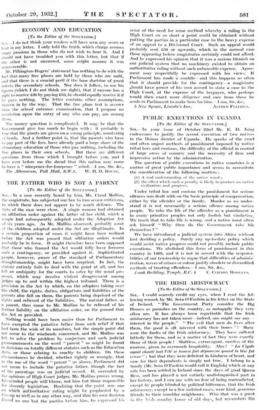PUBLIC EXECUTIONS IN UGANDA [To the Editor of the Sencrsroa.]
your issue of October 22nd Mr. E. D. King endeavours to justify the recent execution of two natives in the Hohna district of Uganda. He speaks of the Cruel and often unjust methods of punishment imposed by native tribal laws and customs, the difficulty of the official in control of large areas of country and the necessity of firm and impressive action by the administration.
The question of public executions in native countries is a matter of great public importance and seems' to necessitate the consideration of the following matters :
(1) A real understanding of the native mind ;
(2) the effect which such a penalty is likely to produce on nativo civilization and progress.
Under tribal law and custom the punishment for serious offences was dealt with on the basic principle of compensation, either by the offender or the family. Murder as we wider- stand it is. not necessarily a serious offence among native people. To take the life of the offender as a punishment is to many primitive peoples not only foolish but vindictive. We teach that to take life is wrong, and a native must often ask himself " Why then do the Government take life themselves ? "
We have introduced a judicial system into Africa wit bout first deciding a policy. Surely any up-to-date policy which would assist native progress could not possibly include public executions. We abolished this form of punishment in this country in 1868, and it is not in accord with the responsi- bilities of our trusteeship to argue that difficulties of adminis: tration, waves of crimes or colour justify obsolete or discredited methods of treating offenders.—I am, Sir, &c.,
Iamb Building, Temple, E.C. 4 C. CLICTON ROBERTS.












































 Previous page
Previous page